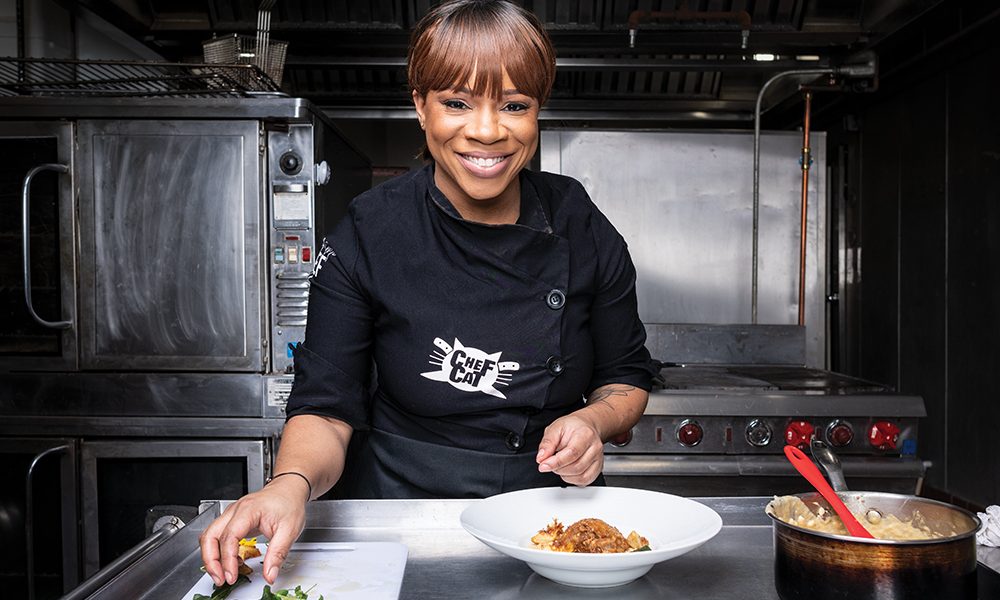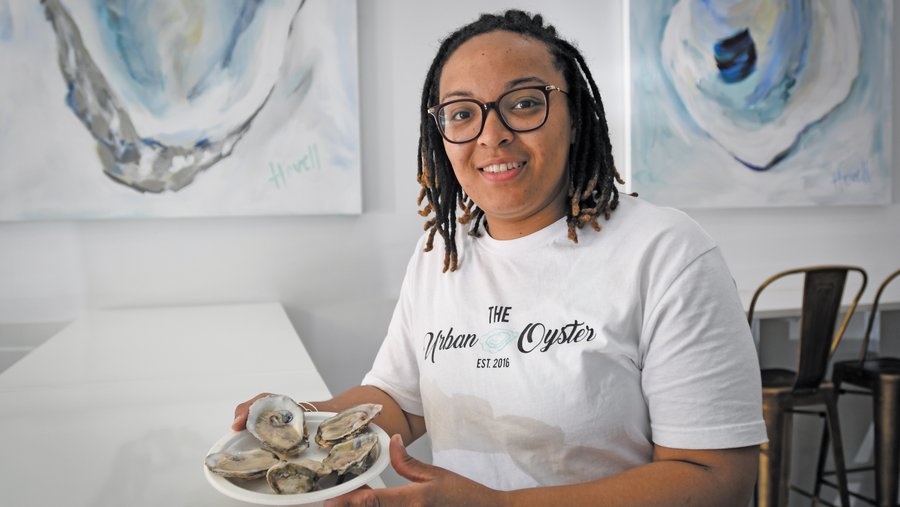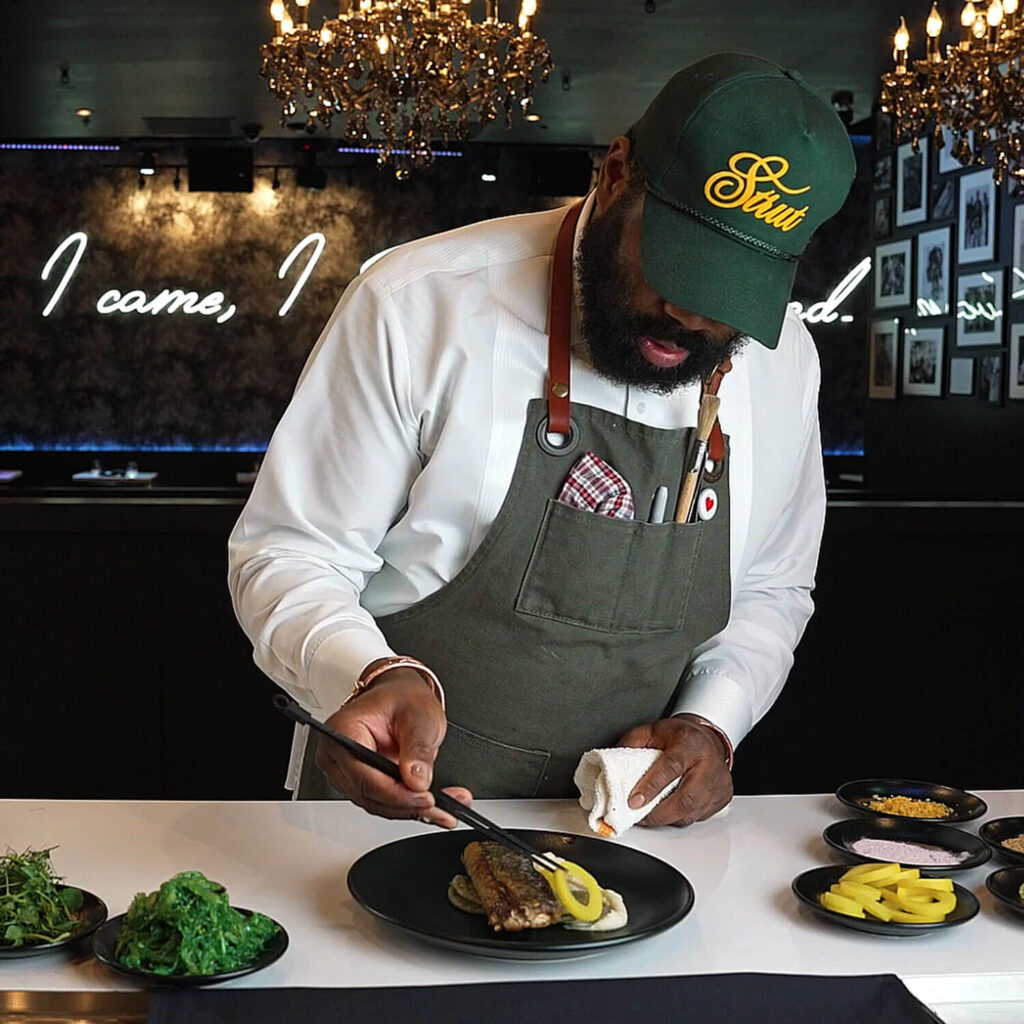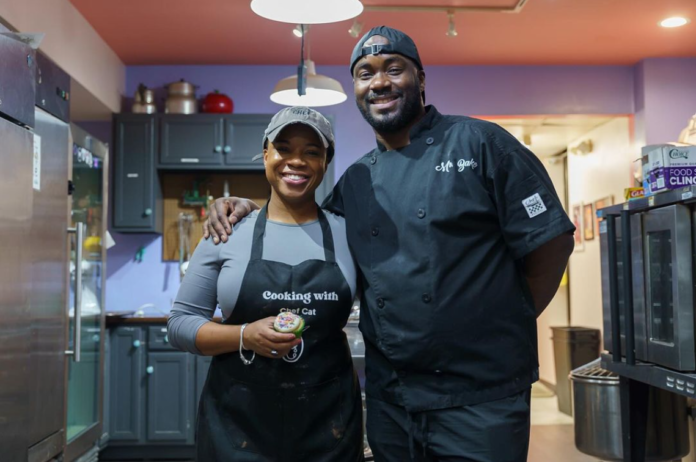( ENSPIRE Community Spotlight ) Meet the Visionaries Redefining Baltimore’s Black Culinary Scene
ENSPIRE Contributor: Mel Jones
This Black History Month, what better way to recognize the unsung contributions of African Americans to US society than through food? In Baltimore, Black-owned dining experiences have always been an integral part of the city’s culture—Charm City was built on Black cuisine. Now, the culinary scene is more alive than ever, with new restaurants and trailblazing chefs creating dishes that tell stories, reclaim heritage, and taste great. Discover the faces behind recent innovations in Baltimore dining, from social activism through food to electrifying beats that elevate every dining experience.
Countless chefs and foodies are contributing to this movement, and each of them brings elements of their personal experiences to the table. Meet some of the culinary visionaries shaping Baltimore’s identity and the stories behind their visions.

Chef Scott Bacon at The Ivy Hotel and Magdalena creates dishes using local flavors and ingredients, making his food feel both elevated and down-to-earth. His commitment to organic and sustainable cuisine is evident in sophisticated dishes such as the local blue catfish, which is served with turnip and mustard green colcannon, trout caviar Béarnaise, and onion grass oil. He cites his Black and British backgrounds as influences in his culinary work.
Creating a comfortable environment in a typically restrictive field by catering to a diverse demographic is important, and Chef Saon Brice does this flawlessly. He puts a new twist on American staples at BLK Swan with every dish and craft cocktail, making the restaurant comforting yet unique. BLK Swan also has in-house DJs, who add to the immersive dining experience.
Chef Jasmine Norton is the first Black woman to own an oyster bar in the U.S. at The Urban Oyster. She cites her love for oysters from a young age and the connection she had with her father through them, as the inspirations for her restaurant. Her goal is to introduce oysters and other seafood to people who are nervous about trying them, making fresh, quality food accessible to all. Available dishes range from deviled eggs and French onion soup to oxtail lasagna and grilled branzino. The Urban Oyster has won multiple prestigious awards from The Baltimore Sun, proving that food doesn’t have to be exclusionary to be excellent.

Chef David & Tonya Thomas at H3irloom Food Group are food historians who are connecting African cultural and religious traditions with modern dining and sustainability activism. They provide catering, event services, teaching tools, and more services that create a welcoming and educational environment for gourmands and up-and-coming chefs.
At Just Call Me Chef and Our Time Kitchen, Chef Catina Smith empowers BIPOC, female, and LGBTQ+ chefs through food. Just Call Me Chef is an organization that connects Black chefs through chef collectives, networking, and other resources, while Our Time Kitchen is a space for women and non-binary people of color to cook good food and build their businesses, breaking the barriers that cause their labor to be undervalued. She strives for Black women in the culinary fields to be seen as not just women chefs or Black chefs independently but accomplished people with intersecting identities who have valuable, fresh perspectives to bring to the table.
New restaurants are also paving the way for different culinary fusions in Baltimore. Rooted Rotisserie, owned by Chefs Joseph Burton and Amanda Ngangana, was established in August 2022 and brings French-style rotisserie to Baltimore. Their trip inspired the husband and wife team to a market in Paris, replicating the techniques down to using an authentic Rotisol oven. They highlight seasonal ingredients in each dish and focus on bringing out their unique flavors.
Another avenue of revitalization in the food scene is through supper clubs and curated dinner series. Supper clubs gained popularity in the US during the 1930s and 40s, because they were a way for Black communities to find solidarity when racial discrimination was at a high. Now, these unique dining experiences blend history with modern flavors, keeping the communal spirit alive through intimate dinners that invite conversation. Supper clubs typically have evolving menus and allow chefs to showcase their culinary talents. They also make space for marginalized groups that are often ostracized by the fine dining scene today.
Besides the regular service at BLK Swan, Chef Saon Brice began the Rare Bird Supper Club to create an immersive, personal dining experience. His vision was to create a private and exclusive experience that also welcomed new diners to his restaurant. Through multiple courses and wine pairings, guests can savor unique flavors and experience the stories behind each dish. Chefs Tonya and David Thomas have also launched a recurring dinner series called “A Story to Tell: An Ode to Hip-Hop,” with food influenced by hip-hop music and culture. Finally, 3 Petals by Chef Catina Smith is a dining experience that brings in a featured local artist to share their work, pairing the food with artistic inspiration.

The dedication and inspiration behind each of these chefs’ work is evident, and they deserve all the accolades they’ve won and more. Dine at any of their restaurants to get a taste of the cultural and creative experiences the city is built on. If you aren’t in the Baltimore area, why not support other Black-owned businesses and restaurants to learn more about the hi: story of food in your community?
Related Articles: Monique Rose Sneed: 7-Figure Entrepreneur in Restaurant, Hospitality and NonProfit Industries,On New Soul Kitchen Chef Jernard Cooks Up A Succulent Seafood Dinner







